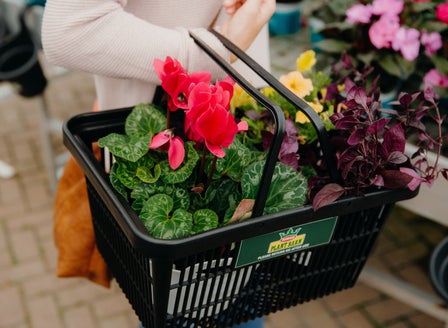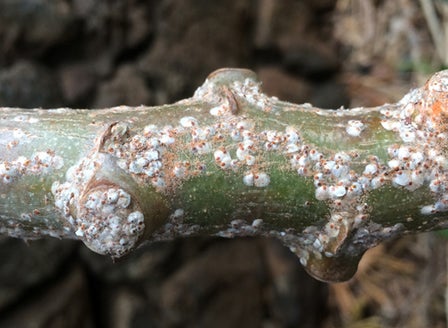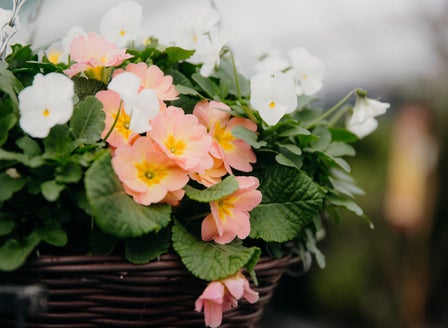Daphne is one of winter’s best scents, which for many of us brings back memories of an older generation’s ornamental gardens. The varieties available in New Zealand are evergreen and are grown specifically for their ornamental winter flowers and unique fragrance.
Planting Calendar
Daphne are best planted from June until early September.
Prepare
Position
Daphne grow better when planted directly into the ground in a position where they are protected from the hot midday sun. Part or dappled shade is best with protection from strong winds.
Soil
When planted into the ground Daphne likes a slightly acidic soil that is free draining and rich in organic matter. To improve the organic content in your soil, break up the soil and add Kings Compost and Kings Sheep Pellets then mix together well. Adding Peat will provide a natural form of acidity to the soil as well. When growing in containers, plant into Kings Container mix. This mix contains added water storage crystals and Saturaid, two products that help maintain moisture in the soil.
Plant
When planting into the ground, gently tap the plant out of its pot. Daphne do not like their roots to be disturbed so take care when planting. Dig a hole twice the depth and width of the plants root ball. Mix Kings Compost into your existing soil at a 50/50 ratio, add Sheep Pellets and , then mix together. Back fill the hole with this soil, so that when planted the top of the plant’s roots sit level with the surrounding ground. Firm the soil down gently and water in well with Aquaticus Organic Garden Booster. In heavier clay soils, where drainage is likely to be an issue, plant onto a raised mound and sprinkle Gypsum Clay Breaker into the bottom of the hole, this helps slowly condition the soil and help to break down the clay. Daphne can be grown in a pot, but make sure it is a large enough to allow for growth. Once you have chosen a variety, take note of how large it will grow to. We recommend choosing a container that is going to be the plant’s forever home, so something like a half wine barrel. Plant into Kings Container as this contains water storage crystals which will enable the soil to hold moisture in for longer.
Care
Watering
When first planting, make sure that you water regularly until the plant is established and growing well. Daphne enjoy good soil moisture in summer. Inadequate water may cause flower buds to drop off and yellowing of the leaf. Water slowly allowing the water to sink down into the roots, rather than allowing it to run off the top of the soils surface. Add Saturaid into the soil at planting as this will help channel the water deep down into the root zone.
Feeding
Daphne enjoy a soil that is slightly more acidic. Feed your daphne in spring after flowering has finished, and in autumn before flowering happens. Feed with an acidic food such as Kings Slow Release Camellia & Azalea food for acid loving plants.
Protecting
Free draining soil is a must with daphne, poor drainage will result in root rot and loss of plants.
Mulching
Mulch around the base of the plants (make sure that the mulch does not come into direct contact with the stem of the plant) with Living Earth More than Mulch. Mulching helps to reduce weeds as well as aiding the soil to retain moisture.
Spraying
Scale and Aphids can be an issue when growing Daphne. Spray with Groventive Garden or for an organic option use Bugtrol as first sign of pests.
Pruning
Daphne are best pruned after flowering, cutting the shrub back by a third to improve form. Remember to occasionally pick the flowers and bring them inside, this also acts as pruning.
General Care
When using sprays, chemicals or fertilisers always read the label and follow the instructions. Apply sprays in the evening to avoid harming beneficial insects.
Beginner Tip
It is best to pick daphne flowers early in the morning when the stems have more moisture in them, this will make them last longer in a vase. Daphne flowers will last in a vase for up to two weeks.
Expert Tip
Yellowing leaves are caused by either poor drainage or a nutrient deficiency, usually iron, nutrient deficiency can be remedied by applying Sequestron.
Top Varieties
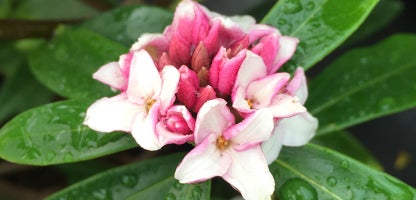
Daphne Leucanthe
Leucanthe is the early bird – the first daphne variety we get in store. Growing to 1 x 1m, these shrubs produce deep-pink buds that burst to soft pinky-white petals. Blooms from July to late August/early September.
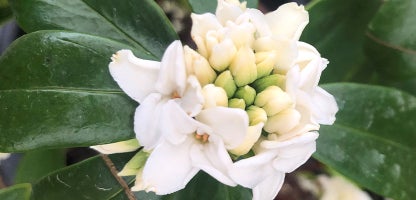
Daphne Alba
Usually in stores in early July, the Alba is a pure-white daphne variety that displays tight clusters of highly scented blooms. Growing to 1 x 1m, the Alba is perfect as a cut flower for winter arrangements, and great for winter weddings.
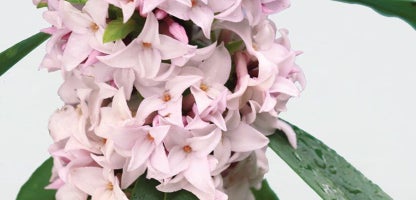
Daphne Perfume Princess
Our all-time favourite Daphne! These come into stores around the end of June, early July, and when in bloom are completely covered in citrusy-scented flowers. They have softer pink buds with white petals. Grows to 1.5 x 1m and blooms from mid-July to September. One of the longest flowering daphne varieties.
Frequently Asked Questions
Why are the leaves going yellow?
This is a common ailment of Daphne bushes, and can happen for different reasons. First, always check that your Daphne is getting the right amount of moisture. Yellowing can indicate irregular watering: too much and the leaves will yellow and drop off quickly, so make sure they are in relatively free-draining soil that will still stay slightly damp; too little water, especially for those in pots, can mean they will eventually defoliate and die. Mulch well to help lock in moisture for both pot and ground-planted Daphne. Daphne that get too much direct sun can start to get discolouration on their leaves, so keep the plants in a party-shaded area – near a fence line, at the back of the house, or wherever there is mottled light. The most common reason Daphne leaves turn yellow is chlorosis. Remedy this by using a tonic such as Sequestron. A good feeding regime will mean chlorosis is less likely to occur.
How often should I water my Daphne plant?
When first planting, make sure that you water regularly until the plant is established and growing well. Daphne enjoy good soil moisture in summer. Inadequate water may cause flower buds to drop off and yellowing of the leaf. Water slowly allowing the water to sink down into the roots, rather than allowing it to run off the top of the soils surface. Add Saturaid into the soil at planting as this will help channel the water deep down into the root zone.
How do I prune my Daphne?
Daphne are best pruned after flowering, cutting the shrub back by a third to improve form. Remember to occasionally pick the flowers and bring them inside, this also acts as pruning.
When is the best time to plant Daphne?
The best time to plant Daphne is in autumn or early spring when the temperatures are mild. This allows the plant to establish its roots before the hot summer months.
What is the best location to plant?
Daphne grow better when planted directly into the ground in a position where they are protected from the hot midday sun. Part or dappled shade is best with protection from strong winds.
